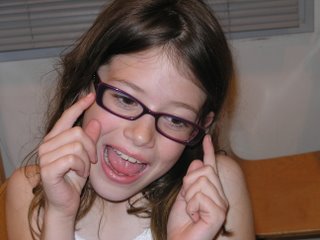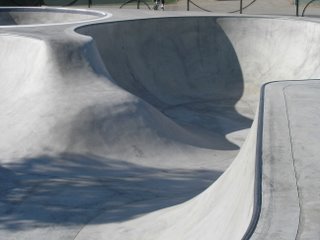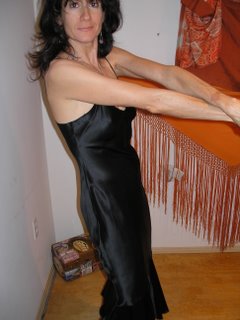1.3.06
It’s strange how life seems to slow down when something awful happens. The earth feels spongier and my whole body heavier as I try to move on the planet. It was a day like most others, that began with morning pulling me out of bed, through the routines of exercise, getting the kids ready, planning the day with my husband, packing lunches for work and thinking many deep thoughts. I was excited about a new word I’d read: Gelassenheit, which is German for serenity. The author quoting it added: “the condition of letting go.” So much of my current sturm und drang lately is this process of letting go of unrealistic expectations of myself, my relationships, life in general, trying to find balance between dreams and working toward them and living in the here and now. I was thinking about what we look for in our relationships to others and to ourselves, how we help or merely witness another person’s journey, hold their hand when asked, go away when needed.
I was looking forward to work, trying something new with my class, checking in with them to see how their journeys were going. I was feeling vibrant, yet a bit sad too in realizing we just don’t get it all in this one life. And I was thinking, pondering, driving the kids to their camp, going the route I go every day, making the same stops and turns I do by rote now. Driving this vehicle I know so well, down the streets I have memorized, accelerating and stopping in perfect rhythm with planned intersections. It’s all programmed as usual. And then I turn left, while thinking about whatever I was thinking about, and suddenly, my windshield goes white as the sun blinds me and I don’t see the young woman making contact with my hood as I brake and she flies up in the air like a gray starfish, limbs akimbo, bags tossed, hair released into a halo around her head. I don’t hear a thing. Don’t even feel the impact, just see the movie of her body slowly swim through the air and land softly on the street in front of me. I jump out thinking, what they all say, “this isn’t happening” and approach her lying on the street as I hear a siren. I bend down and put my hand on her shoulder as she groans and say I’ll call 911 but a passing ambulance has already pulled into our lane so there’s no need. Three ambulance men swarm around her as I stand stunned. What has happened? How? Why couldn’t I see her? I check on the kids and tell them what’s happened and then ask the guys if I should call the police. They say it's already done. I bend down and tell her I’m so sorry, I didn’t see her, the sun was in my eyes. They attend to her, ask her where it hurts. Now the police have arrived and people have gathered on the street and I watch as the additional EMT’s assess her. She is awake and they have collared her, asked her to move legs and feet, which she does. They ask if anything hurts as they slide her onto the board and she winces at her left thigh but other wise seems okay. The EMT guys are non-chalant, so it doesn’t feel like high drama except inside my head. But there she is, helpless. I have hit her. I was thinking.
The policeman takes my report and an elderly woman in a yellow quilted coat and very pink lipstick (why do I remember this) offeres her witness. The young woman, is being put into the ambulance and I go up and ask her her name which she says softly, Eun Jung, and now she is even more real. She has pale skin, dark eyes and looks very young, solid. I touch her again and say I am sorry. They slide her up into the back and tell me where they are taking her as they pack her bags (which for some reason I have noted include a fashion shopping tote and a stray bottle orange juice) along side her and now sweep her away. I check on the kids again. Hanah is wide eyed and Noah hiding, I tell them she will be okay and then turn back to the policeman. He continues filling out a form and then takes the witnesses account out of earshot and I am aware of wondering if she saw something I didn’t; she looks so disapproving. And I’m shaking, wondering what have I done to this poor woman, will she be okay, what are the kids thinking, what are these people thinking, will I be sued, how can I reach out to her, what do I do now? The witness now approaches me and puts a hand gently on my arm and asks how I’m doing. I am surprised at her kindness and start crying again, thank her, say I’m worried about Eun Jung. She says something else I can’t remember and then moves on. I call my husband tell him what’s happened and then have to deal with the policeman again, who reassures me that he’s a collision cop, or something, that he’s seen it all and this wasn’t that bad and to take care of myself and then recites what he’s done and some other stuff that seems so formulaic and I just want to scream, “ I just hit a woman with my car, how can I make it better!” But I am aware of the kids and his strong body up on the curb is telling me to go home and relax and then another woman comes up, I guess a store owner, and asks how I’m doing and I’m grateful that no one yet has told me what a terrible person I am. She offeres me a glass of water, but I decline as I continue to shake and think, “what have I done, how can I make it better?” I get my paper work and the woman does bring my water which I welcome and she says something comforting and I I feel a little more stable.
And then I am released back into the path I was on, take the kids to their camp and call my husband who’s on his way for some reason, and I’m not sure why. I am thinking how I will write about this and wonder what's wrong with me that this thought even enters my head at this moment. Hanah seems okay, but Noah won’t talk to me, so I let the director know what’s happened in case they have trouble. I head to the hospital, not knowing what I can accomplish, as my mind races through the logistics of liability insurance, umbrella policies, protecting assets and I can’t stand that these thoughts can even have purchase in my head while this woman’s life may have been forever altered by the confluence my inattention and the angle of the sun. My husband advises me against trying to talk to her and I’m pissed because it’s the human thing to do, for god’s sake, yet I live in a friggin culture that makes me aware that my mere human instincts to make amends, offer whatever I can, or to say simply I’m sorry puts me at risk of some 1-800 lawyer trying to make a buck.
At the ER I tell some nice woman why I’m there, to offer whatever I can, and she finds Eun Jung, reports back that there’s nothing she wants from me. I ask how she’s doing, but of course they can’t tell me and my husband arrives and I know I’ve done all I can do, but it doesn’t feel right, or like enough. We head home and I recount the event, we deal with insurance companies and the adjuster who asks about the van, any damage done to the vehicle (as had the police officer) and all I can think is why do they care about the friggin car? I hit a woman. Stare Farm takes my report and informs me of what will happen next and how my rates will go up, and I tell them I don’t care, how can I find out about Eun Jung? They tell me the adjuster will call and when she does, I ask her as well, and all I can do is wait for the medical report. I tell her that I want to contact Eun Jung, but am aware that people are advising me not to and she corroborates that it’s not a good idea, due to litigious issues etc. and I ask if I can at least send a card and she thinks that’s fine.
Michael and I wonder how best to deal with the kids. I call my therapist who advises that if they’re okay at camp, leave them there, but later give them a way to process it. So Michael and I talk practicalities again and my head is swimming with the symbolism of this event. This has been my greatest fear in life, that I would do someone great harm and now I have and I don’t know the extent. I was not driving negligently, not speeding, or on my phone, but I was thinking thoughts and this may have distracted me. My presence has done some damage to someone else’s life.
I wonder if it is irony or kismet that I have recently been processing this desire to feel that I matter in life, and was thinking as I turned that corner that I do matter to some people but don’t know about others. I was wondering how to manage these feelings that come up when I feel adrift in my relationships. I was thinking. Was my head turned the wrong way? Was I not seeing? I was thinking. Did the sun’s rays bend in a new way at that particular time of the day? I was thinking.
I can look at this as a mere collision of journeys, of wrong timing, of simple human frailty. But I am flooded with guilt. I have had so many frissons of near misses on these freeways, of my own and others’ making. We catapult through space, as Michael likes to say, in these deadly machines and only luck and close attention keeps danger at bay. He reassures me that I am not the only one who gets blinded by the sun, that we are lucky she was young, that the EMT’s were blasé, that she is probably going to be okay. But I don’t know this. And it doesn’t matter. I hit her. My presence has done damage. I was thinking.
Guilt and shame. Shame that thoughts about protecting my assets even entered my mind in this culture where everyone sues everyone. Shame that I keep talking about, counseling and trying to live in the here and now, but was thinking about something else in the moment. Shame that I wonder if I can ever forgive myself and allow myself to smile again. Guilt that I didn't leave my house a minute later or sooner. Guilt that I was busy thinking.
I come home to my life as it always is. I take a walk and want to find a pastor, a guru, a church, a temple but know not where to turn so I talk to a friend and the distraction helps. The sun is warm and I am cold. People smile at me as I pass. Everything is normal and I could just chalk this up to “life in the big city.” The insurance companies will “take care of everything, leave it to us.” But I feel the need to make amends, to atone, not only to this woman who intersected the unholy trinity of my thoughts and certain rays of light and a ton of steel, but to all who have been affected by my presence. This is not how I want to connect. And it is certainly not the only way I am in this world. But if it is a wake-up call, to pay attention, I have heard it.
The family returns. The kids are normal and the world goes on around me. I sit here writing, wondering why it helps, but it does. I think of how I wish to craft this telling to make meaning of what has happened, how I care about syntax and vocabulary and what writing means to me, how I want to leave something behind, how some of us want to turn life's accidents and traumas and losses into something of meaning, artful. The Mexican photographer who was recently reviewed for his incredible pictures of people in death. The kids need and get there normal routine of dinner with an added dose of Spongebob. But there is someone in pain out there and I want to take her soup. I want to tell her again that I am sorry. Michael tells me that Hanah says the hand was red when I entered the crosswalk, meaning perhaps that Eun Jung was crossing against the light. I don’t know. I can’t remember if the light was yellow or green. It seems irrelevant. I hit her. I was busy thinking. I want to make it better.
Some say there are no accidents. And I can peel away the symbolism of any single event or confluence of occurrences and right now accept that I live in a car culture that puts all of us at risk. I can say it was the sun, that I wasn’t paying attention, that maybe she wasn’t paying attention. But my truth is that I was thinking. Thinking about how we live in this world, how we connect, how I wish to connect. Thinking, then, boom, Impact.









